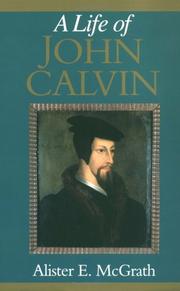| Listing 1 - 4 of 4 |
Sort by
|

ISBN: 0631189475 Year: 1993 Publisher: Oxford, UK Cambridge, Mass., USA B. Blackwell
Abstract | Keywords | Export | Availability | Bookmark
 Loading...
Loading...Choose an application
- Reference Manager
- EndNote
- RefWorks (Direct export to RefWorks)
Calvinism --- Calvinisme --- Reformed Church --- Doctrines --- Calvin, Jean --- Influence --- Reformation --- Biography --- Calvin, Jean, 1509-1564. --- Reformation - Biography. --- Calvin, Jean, 1509-1564 - Influence.
Book
ISBN: 9782600016117 2600016112 Year: 2012 Volume: 512 Publisher: Genève: Droz,
Abstract | Keywords | Export | Availability | Bookmark
 Loading...
Loading...Choose an application
- Reference Manager
- EndNote
- RefWorks (Direct export to RefWorks)
In the 16th Century the Bible was also studied collectively. Developing the Zurich model, the preachers of Geneva met weekly to study biblical books in lectio continua. In these congrégations every minister took his turn to present an exposition to his colleagues. In closed meetings the ministers held disputations on matters of doctrine and ethics and the voices of lesser known ministers are heard in surviving documents. In these collective studies, inspired exposition of Scripture was regarded as prophecy, fundamental to preaching of the Word. The first part of this book describes the structure and activities of this ecclesiastical institution on the basis of archival documents. The existence of a large body of manuscript texts on Joshua testifies to the esteem in which the congrégation's work was held. The second part analyses how the weekly Bible studies interacted with the implementation of Calvin's expository program. The third part traces the influence of Geneva until the 'prophesyings' in Puritanism, as other such forms of 'schools of the prophets' developed in France, England and the refugee churches.
Calvinism --- History --- Calvin, Jean, --- Influence --- Compagnie des pasteurs de Genève --- Influence. --- Compagnie des pasteurs de Genève --- Bible --- Study and teaching --- Prophecies. --- History of Europe --- Christian church history --- Geneva --- Calvinism - Switzerland - History - 16th century --- Calvin, Jean, - 1509-1564 - Influence --- Calvin, Jean, - 1509-1564
Book
ISBN: 9782830916348 2830916344 Year: 2017 Publisher: Genève: Labor et Fides,
Abstract | Keywords | Export | Availability | Bookmark
 Loading...
Loading...Choose an application
- Reference Manager
- EndNote
- RefWorks (Direct export to RefWorks)
Comment devons-nous agir personnellement et en société ? A cette question, que Calvin place au coeur de son projet réformateur, ce livre apporte un regard nouveau, mettant en perspective trois manières d'entendre le commandement de Dieu, selon qu'il s'adresse à tout humain, au chrétien et au saint en devenir. Ainsi se trouve restituée dans sa dimension théologique une éthique qui a profondément marqué nos sociétés contemporaines, tant du point de vue des moeurs que pour le politique et l'économie. Avec ses parts d'ombre et de lumière, Calvin apparaît ainsi comme l'une des grandes figures de la Modernité.
Calvin, Jean, --- Calvijn, Johannes --- Calvin, Jean --- Ethics. --- Influence --- Ethics --- 2 CALVIN, JEAN --- 2 CALVIN, JEAN Godsdienst. Theologie--CALVIN, JEAN --- Godsdienst. Theologie--CALVIN, JEAN --- Calvinus, Johannes --- Calvin, Jean, - 1509-1564. --- Calvin, Jean, - 1509-1564 - Influence --- Calvin, Jean - Ethics --- Calvin, Jean, - 1509-1564
Book
ISSN: 12430587 ISBN: 9782812408021 2812408022 Year: 2012 Volume: 76 Publisher: Paris Classiques Garnier
Abstract | Keywords | Export | Availability | Bookmark
 Loading...
Loading...Choose an application
- Reference Manager
- EndNote
- RefWorks (Direct export to RefWorks)
Hommage de Jean-François Gilmont
Calvin, Jean --- Criticism and interpretation --- Congresses --- Influence --- 2 CALVIN, JEAN --- 2 CALVIN, JEAN Godsdienst. Theologie--CALVIN, JEAN --- Godsdienst. Theologie--CALVIN, JEAN --- Calvijn, Johannes --- -Influence --- -Conferences - Meetings --- Calvin, Jean, --- Critique et interprétation --- Actes de congrès --- Appréciation --- Calvinus, Johannes --- Calvin, John --- Congresses. --- Critique et interprétation --- Actes de congrès. --- Appréciation --- Critique et interprétation. --- Appréciation. --- -Calvin, John --- Calvin, Jean, - 1509-1564 - Criticism and interpretation - Congresses --- Calvin, Jean, - 1509-1564 - Influence - Congresses --- -2 CALVIN, JEAN --- -Calvin, Jean --- Calvin, Jean, - 1509-1564 --- -Calvin, Jean,
| Listing 1 - 4 of 4 |
Sort by
|

 Search
Search Feedback
Feedback About UniCat
About UniCat  Help
Help News
News